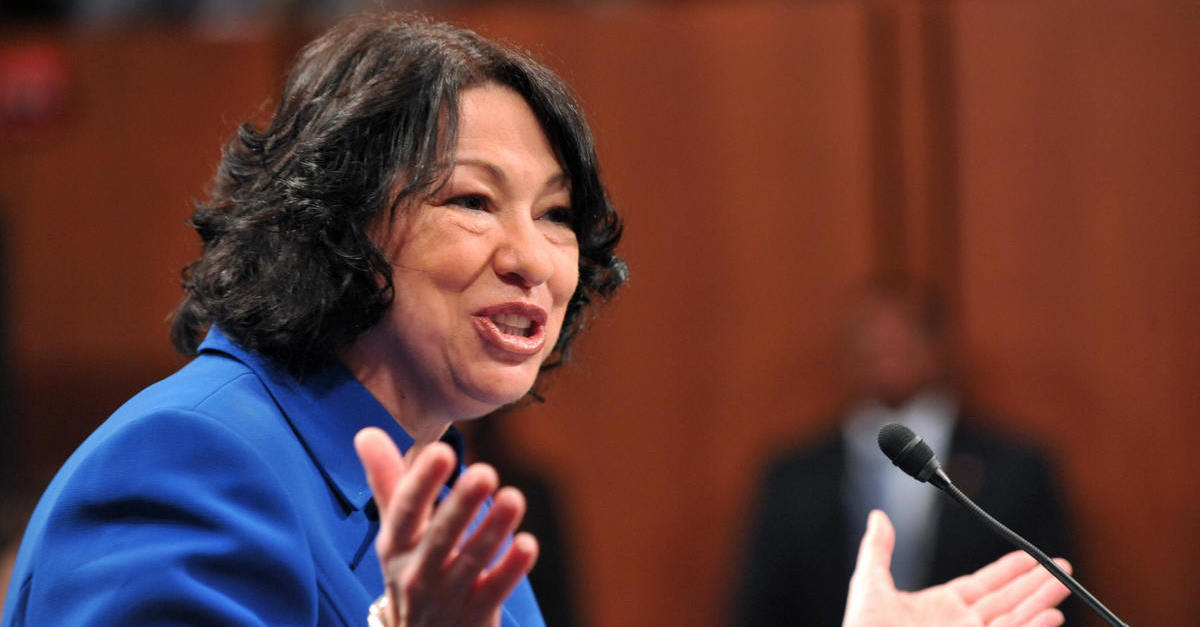
The U.S. Supreme Court heard oral arguments on Wednesday to determine whether or not the U.S. Constitution requires members of the electoral college to actually vote for the presidential candidate who won the state from which those members are elected.
Supreme Court Justice Sonia Sotomayor called out Washington State Solicitor General Noah Purcell during a back-and-forth about specific language related to electoral college laws and the system originally devised by the nation’s founders.
“You rely on a default rule in your brief” Sotomayor began. “Which is the power to appoint [which] includes power to remove. But all of the examples that you rely on are vertical appointments when an official within one branch of government appoints a subordinate in the same branch for an indefinite period. Now, the idea is that if I appoint you, I should be able to get rid of you if in your service to me you are doing something wrong.”
Washington State’s reply brief is technically an attempt to argue that states have the ability to fine individuals who are appointed as presidential electors but who vote against the winner of that state’s popular vote. And the argument isn’t strictly academic.
In 2016, Peter Chiafolo was chosen as a member of the Evergreen State’s electoral college. Instead of voting for the winner that year, Hillary Clinton, Chiafolo voted for disgraced former general Colin Powell instead. Under Washington’s “faithless elector” law, he was fined $1,000. Chiafolo challenged that law as unconstitutional–insisting electors can vote as they choose without sanction. He is being represented by Harvard Law Professor and constitutional scholar Lawrence Lessig–who views the ability of electors to vote their conscience as a bulwark against a slide into illiberal autocracy.
Sotomayor appeared to be largely sympathetic to Chiafolo’s position and eventually dinged Purcell for a vocal slip.
“But here, the state is appointing a voter to do something that most people think of as requiring judgment and some measure of freedom–which is the power to cast the ballot,” the liberal justice continued. “The other side in its brief points out that there were other words that would’ve connoted something different than ‘elector,’ like a delegate. You appoint a delegate to cast a vote for you. But that’s not what Congress chose. An elector has a sense of someone that is going to vote. So, how can you say that that tradition within the executive branch of the power to remove is controlling here?”
“Justice Sotomayor, there’s really three fundamental problems with the electors argument on that front, there’s a textual problem, a historical problem–” Purcell attempted before being abruptly cut-off.
“I don’t think it’s their problem, I think it’s your problem,” Sotomayor corrected.
Hear the exchange for yourself:
The case stylized as Chiafolo v. Washington was actually the first of two electoral adultery cases heard by the high court on Wednesday. The second concerns a would-be faithless elector, Michael Baca, who was removed from his position in the Colorado electoral college in 2016 after attempting to vote for then-Ohio governor John Kasich instead of Clinton. He was replaced before that vote was cast.
The second case is stylized as Colorado Department of State v. Baca.
Typically those proceedings would have been consolidated into the same set of arguments because of the identical legal issues and the overwhelmingly similar set of facts involved–but Sotomayor is longtime friends with one of the other potential renegade electors from the Mile High State, Polly Baca (no relation to Micheal Baca), and she hung up her phone as the second set of arguments began.
Over the course of American history, a total of 167 electors have voted faithlessly. In 2016, seven electors ultimately cast faithless votes–three attempted to but were replaced. Chiafolo’s and Baca’s argument notes that a 10-person swing in the overall electoral college would have altered five past presidential outcomes. And, they think that’s exactly what folks like Alexander Hamilton intended.
And at least one lower court has agreed.
[image via NICHOLAS KAMM/AFP via Getty Images]
Have a tip we should know? [email protected]